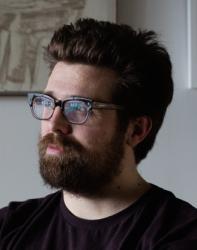With his eighth novel, “More,” published by Arcade, Hakan Günday entered the relatively small group of contemporary Turkish authors whose work is available in English translation. His standing in that group was cemented when an earlier work, “The Few,” was published in translation last fall. Günday is one of the many international authors who will be attending the Reykjavík International Literary festival this April.
A sustainable state of evil
“More” is narrated by a boy named Gaza, who from childhood takes part in his family’s bloody business of human trafficking. The novel offers a dark and poignant look at the ongoing refugee crisis and is filled with disturbing scenes of violence and callousness.
“I’m more concerned with how people get used to violence than I am with violence itself,” Günday explains. “I find that far more dangerous and horrifying. My characters are lost in a vicious cycle, living with permanent violence yet unaware of their situation. They’re living in a sustainable state of evil.”
For the love of words
Despite its violent imagery, Günday’s writing is also filled with evidence of his love language. The names of his books and characters often contain elaborate word games that may sadly become lost in translation.
“My favourite book is the Turkish dictionary,” Günday says. “It contains thousands of words that are waiting for their stories to be told. In Turkey, and everywhere else where populism reigns, words are the first things that the authorities target. The first act of an authoritarian regime is to write its own dictionary, changing the meaning of words in order to control our communication. I want to do my best to remind my readers of the true meaning of words.”

Fighting man’s natural tendencies
Perhaps due to Turkey’s centuries old poetic traditions, the novel form was a relative latecomer in Turkish literature. Early novelists were influenced by translations of Russian and European literature—Günday himself lists French novelist Louis-Ferdinand Celine’s “Journey to the End of the Night” as an early inspiration.
“That book showed me how man has a natural tendency to become merciless and dumb,” he reminisces. “You have to accept that first if you want to change your nature.” He also mentions the influence of Turkish writer Oğuz Atay, a pioneer of the Turkish novel form who wrote several complex psychological novels in the 1970s.
Forcing yourself to stay awake
Looking back, Günday says he can see a common thread in these early inspirations: “These writers were trying to tell us that sensibility is a muscle. If you train that muscle then you might be able to stay awake. Otherwise you allow society and the authorities to put you to sleep. If they put you to sleep, your dreams will never be your own. You will be left with the dreams of those that put you to sleep.”
The Reykjavík International Literary Festival will be held in Reykjavík April 24th – April 27th. You can find more information about the festival in English here.
Buy subscriptions, t-shirts and more from our shop right here!


















